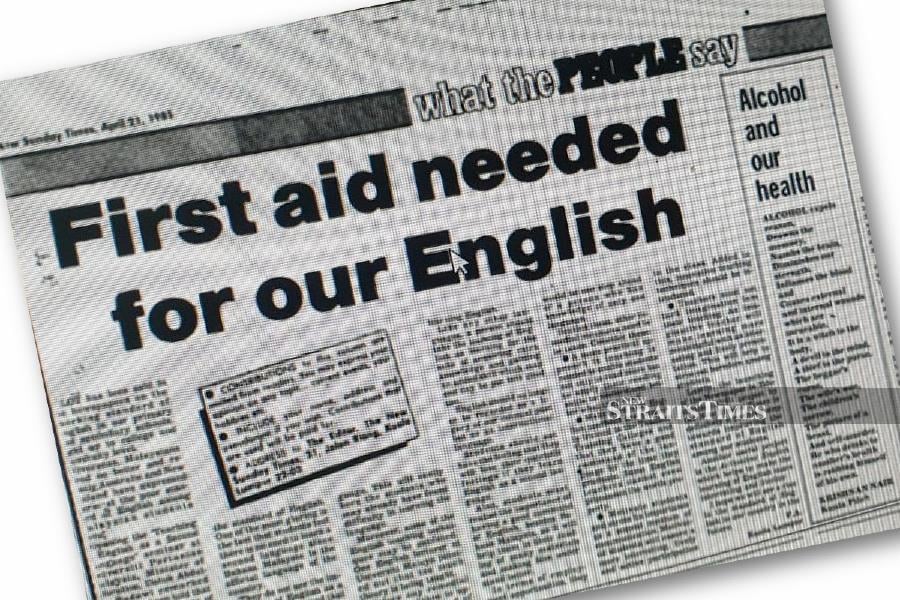IF your understanding of English remain weak, how are you going to help and assist Malaysia whether the storm and get through the problems to ensure progress and development for all.
Looking at language problems, worries will set root. How will you assure your role, in the various development and growth goals.
Heh-heh. Are you scratching your head about the preceding paragraphs?
There are weaknesses in the sentences, to put it mildly. But I am convinced you understand what they seek to convey. Isn't that the most important thing?
You don't have time to dissect the language anyway. You need to jump over words like a runner over hurdles. Hey, you may not even read the whole story.
A few years ago, The Washington Post reported on a study by computer scientists at Columbia University and the French National Institute.
It said: "59 per cent of links shared on social media have never actually been clicked: In other words, most people appear to retweet news without ever reading it."
Then there was the American media expert who visited the New Straits Times Press more than 20 years ago, when the Internet was but a child. She told us people did not have the time and inclination to go beyond a few paragraphs in any story in a newspaper.
But I digress.
The point I am making is that for the majority of people, it's good enough that they get the gist of what a writer is saying.
A few might puzzle over the use of a word, or how a sentence is structured, but I doubt they have the time, desire or stamina to dwell on it.
Aha! It's the same reason why many souls will overlook the irreconcilable use of 'puzzle over' and 'not dwell on it' in the preceding line.
I suppose we need to accept that a good number of people will not notice the faults in a sentence anyway. They know what the writer is saying and that's that.
Writers don't always get everything right. That's natural. And that's why they need someone else to check their work. Anyone who has laboured in a media organisation will tell you that. The pace is frenetic and slip-ups are common.
But there are also writers whose work reflects a profound weakness in the language. I've seen their essays and missives. They are from communications firms, the government, universities, schools, law firms, etc. They are politicians, engineers, CEOs, business analysts, accountants, academics, straight-A students, so-called hotshot lawyers, etc.
Do not howl and growl at me. The people I mentioned are experts in their fields. I'm not doubting that. It's just that they are unable to articulate thoughts strictly in accordance with the rules of the language. That's not their field. I mean, can an engineer operate on your heart?
I believe the same troubles afflict Bahasa Melayu. Deficiencies in the expression of language are normalised so that only a few can tell the difference any more. (Dewan Bahasa dan Pustaka, in a chariot of anger, wants to unleash a RM50,000 fine to mend this. By Jove!)
What I am about to say may make purists angry. So let me first apologise.
Perhaps it's time to move on. Do not agonise over the poor command of the language. Many of those making the most noise about this subject are themselves purveyors of fractured English. But they don't realise this.
Yes, it's good to write well. But readers must understand what's said. Many would in fact argue that the latter is more important. And that verb-and-preposition errors, syntax, malapropisms, etc. are secondary.
In the age of TikTok, there's no need to write creatively like Dickens, or to the point like international news agencies do, they would say.
Am I asking you to embrace mediocrity? Certainly not. But perhaps we should accept reality. Our culture and civilisation will not be destroyed by doing so.
We have had thieving and lying politicians for a long time. And we have complained about "bad English" for ages, too. Look, we are still around, aren't we? The universe balances itself out amid contradictions.
The purists will ensure that we always have a language lodestar. A good number of people will follow it. Others will know who to turn to for help.
As far as the English language is concerned, we have, by our sloppiness, crossed the Rubicon.
So do not scratch your heads any more yah, when you read: "In order to improvise proficiency in English, you must read plenty of books to help and assist Malaysia whether the storm and get through its problems." Just weep unceasingly.
The writer is NST production editor






